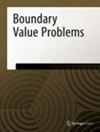化学反应和非线性热辐射对垂直板自然对流传热传质的综合影响
IF 1.7
4区 数学
Q1 Mathematics
引用次数: 0
摘要
本文分析了垂直板附近受高度非线性热辐射和化学反应控制的层流边界层流。利用布森斯克近似来预测密度随温度和浓度变化的非线性性质。板表面采用对流表面边界条件。与流体流动相关的偏微分方程被转换为常微分方程,并在采用拍摄程序后使用 Runge-Kutta 方法进行求解。一些主要发现是,辐射热通量增加了边界层内的热能,从而降低了流体粘度,产生了速度曲线。在较高的化学反应应用中,动量和浓度边界层厚度变薄,而热边界层变厚。流体在边界内的反向速率随化学反应参数的增加而增加。此外,边界层内的传质速率随化学反应参数的变化而增加,但从板表面传入自由流区域的热量则相反。当非线性密度随温度和浓度变化较大时,边界层内的可逆流体流动明显增加。本文章由计算机程序翻译,如有差异,请以英文原文为准。
On the combined effects of chemical reaction and nonlinear thermal radiation on natural convection heat and mass transfer over a vertical plate
The analysis of a laminar boundary layer flow near a vertical plate governed by highly nonlinear thermal radiation and chemical reaction is presented. The Boussinesq approximation is used to predict the nonlinear nature of density variation with temperature and concentration. The plate surface was subjected to the convective surface boundary condition. The partial differential equations relevant to the fluid flow was converted to ordinary differential equations, which were solved using the Runge–Kutta method after employing the shooting procedure. Some major findings are that the radiative heat flux increases the thermal energy within the boundary layer and thereby reduces the fluid viscosity, which gives rise to the velocity profile. At higher chemical reaction applications, the momentum and concentration boundary layer thickness become thinner, whereas thicker for thermal boundary layer. The rate at which the fluid reverses within the boundary increases with chemical reaction parameter. Moreover, the rate of mass transfer within the boundary layer is enhanced with chemical reaction parameters, but the contrary is true for heat transfer from the plate surface into the free stream region. There is an observable increase in the reversible fluid flow within the boundary layer for higher nonlinear density variation with temperature and concentration.
求助全文
通过发布文献求助,成功后即可免费获取论文全文。
去求助
来源期刊

Boundary Value Problems
MATHEMATICS, APPLIED-MATHEMATICS
CiteScore
3.00
自引率
5.90%
发文量
83
审稿时长
4 months
期刊介绍:
The main aim of Boundary Value Problems is to provide a forum to promote, encourage, and bring together various disciplines which use the theory, methods, and applications of boundary value problems. Boundary Value Problems will publish very high quality research articles on boundary value problems for ordinary, functional, difference, elliptic, parabolic, and hyperbolic differential equations. Articles on singular, free, and ill-posed boundary value problems, and other areas of abstract and concrete analysis are welcome. In addition to regular research articles, Boundary Value Problems will publish review articles.
 求助内容:
求助内容: 应助结果提醒方式:
应助结果提醒方式:


